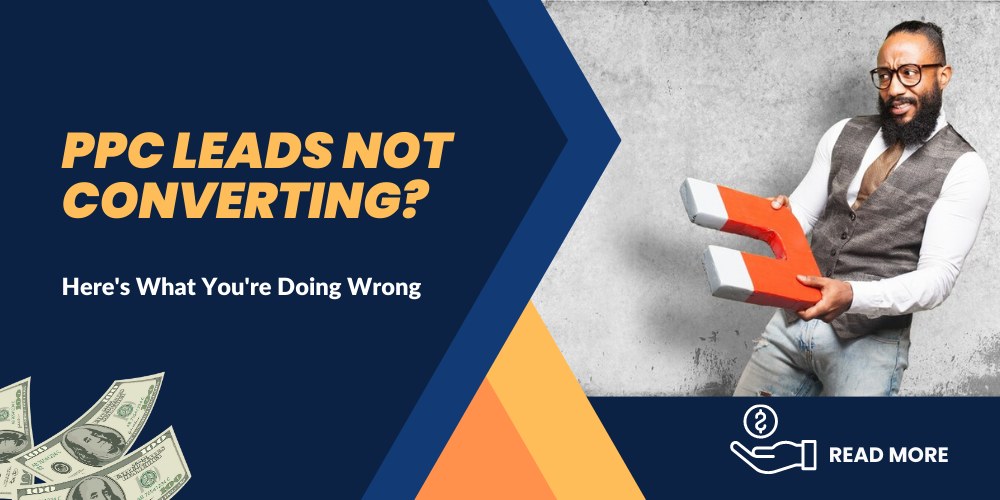Transforming PPC Leads into Conversions
Introduction:
Pay-per-click (PPC) advertising is an effective way for organizations to reach the people they want in the ever-evolving field of digital marketing. However, as any professional marketer understands, achievement in PPC isn't just measured by the number of clicks received; it's also measured by the conversion of those clicks into concrete leads.
The actual measure of PPC efficiency is lead conversion, the key moment when a curiosity-driven click converts into a satisfied client. In this article, we explore the centers of PPC lead conversion, analyzing its importance, identifying the barriers to it, and proposing practical techniques for overcoming these roadblocks.
The actual measure of PPC efficiency is lead conversion, the key moment when a curiosity-driven click converts into a satisfied client. In this article, we explore the centers of PPC lead conversion, analyzing its importance, identifying the barriers to it, and proposing practical techniques for overcoming these roadblocks.
What is pPC?
PPC, or Pay-Per-Click, is a type of digital advertising technique in which marketers pay a charge for every time a user clicks on their ad. It's an advertising strategy that helps companies position their ads prominently on the results pages of search engines and other online channels.
This method provides quick exposure to a specific audience, promoting a direct relationship between organizations and prospective consumers. Major platforms such as Google Ads and social media offer a solid foundation for running PPC campaigns.
This method provides quick exposure to a specific audience, promoting a direct relationship between organizations and prospective consumers. Major platforms such as Google Ads and social media offer a solid foundation for running PPC campaigns.
What is the importance of lead conversion in PPC?
The goal of lead conversion is at the core of any PPC campaign. Clicks, while crucial, are merely the first action. Conversion, whether a sale, a sign-up, or any other kind of targeted action, is the increase that marketers want to achieve. Effective lead transformation not only generates income but also measures the effectiveness of the campaign and aligns with the primary goal of converting potential into satisfied consumers.
The 5 Most Common Reasons Why PPC Leads Don't Convert
1. Irrelevant Keywords:
The Building Blocks of Success The significance of picking the appropriate keywords shouldn't be understated. Relevant keywords are the core of your PPC campaign's success, just as a strong foundation is essential for a structure. Keywords that are closely relevant to user intent guarantee that your advertising is viewed by the correct people.
Long-tail and particular keywords reduce the danger of unnecessary clicks, increasing the possibility of conversions. Effective keyword research is required to strike the ideal balance between keyword relevancy and search volume.
Long-tail and particular keywords reduce the danger of unnecessary clicks, increasing the possibility of conversions. Effective keyword research is required to strike the ideal balance between keyword relevancy and search volume.
2. Ineffective Ad copy:
Mixing emotions into words: Ad copywriting is an art form that may make or ruin your campaign. Your ad conversation, like a captivating storefront title, must be short, exciting, and straightforward in delivering your value offer.
Identifying your target audience's pain points and providing a solution can greatly improve click-through rates and, as a result, conversions. Testing and improving your ad text on a regular basis based on performance data is vital for adjusting your communication.
Identifying your target audience's pain points and providing a solution can greatly improve click-through rates and, as a result, conversions. Testing and improving your ad text on a regular basis based on performance data is vital for adjusting your communication.
3. Poor Landing Page:
Engagement and Sales Meet, consider entering into a nicely designed store only to discover it is a confused event on the inside. Similarly, for a consistent user experience, a well-designed landing page is essential. Your landing page should be consistent with the promises stated in your advertisements.
It should have a clear call to action as well as relevant, simple content that directs users toward conversion. To keep consumers interested and inspire them to take steps, focus on mobile responsiveness, fast load speeds, and an easy layout.
It should have a clear call to action as well as relevant, simple content that directs users toward conversion. To keep consumers interested and inspire them to take steps, focus on mobile responsiveness, fast load speeds, and an easy layout.
4. Low Ad Quality Score:
The Relevance Index Search engine algorithms rely on usefulness, and a low-quality score indicates a lack of it. It is critical to seriously organize your campaigns by logically structuring keywords and ad groupings.
Make your ad copy unique for each and every ad group to create a smooth user experience from investigation to landing. A better quality score not only enhances ad ranks but also lowers the cost per click, allowing you to maximize your advertising budget even further.
Make your ad copy unique for each and every ad group to create a smooth user experience from investigation to landing. A better quality score not only enhances ad ranks but also lowers the cost per click, allowing you to maximize your advertising budget even further.
5. Leads are not being followed up on:
Finalizing the Agreement Fastness is essential in the energetic digital world. Responding quickly to queries or sign-ups demonstrates your passion and trustworthiness. To nurture prospects over time, consider creating automatic email sequences or tailored follow-ups. You may boost the possibility of future conversions and turn potential consumers into committed brand supporters by keeping in regular contact.
5 Proven Techniques to Boost Your Pay-Per-Click Campaign's Performance
1. Select the correct keywords:
Spend time researching keywords. To uncover suitable terms and their search volumes, use tools like Google Keyword Planner. Concentrate on long-tail keywords, which reflect the intent of users, and analyze and modify your keyword list on a regular basis to remain on top of continually changing trends.
2. Create Captivating Ad Copy:
Create ad copy that is appealing to your target group of people. Benefits should be highlighted, pain areas should be addressed, and strong calls to action should be included. Performing A/B testing on multiple ad copy variants can give useful insights into what connects most with the audience you are targeting.
3. Develop a high-converting landing page:
Create landing pages with a customer-focused mindset. Make sure you have a clear title, concise text, aesthetically attractive pieces, and an easy-to-use layout. A/B test different landing page components for optimal performance for conversions.
4. Raise Your Quality Score:
Analyze and modify your campaigns on a regular basis. Arrange keywords into suitable ad groups, write customized ad content, and route consumers to landing sites that correspond to their intention of searching. As your quality score rises, you'll benefit from better placements for ads and lower prices.
5. Promptly follow up with leads:
Implementation of a successful lead nurturing plan To keep leads engaged, use automated email sequencing or customer relationship management (CRM) solutions. To help leads through the process of the conversion funnel, personalize your message and deliver relevant information.
Conclusion:
Success in the complicated dance of PPC lead conversion is dependent on resolving the fundamental factors that interfere with conversion. You may convert clicks into conversions by using the proper keywords, writing attractive ad text, structuring landing pages, increasing quality scores, and immediately following up with leads. Remember that the entire process from click to conversion is a team effort, including strategic preparation and flawless implementation, which will result in a more robust and productive PPC campaign.

